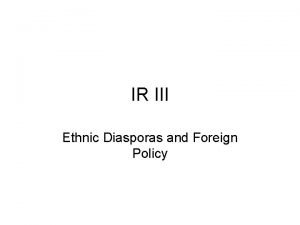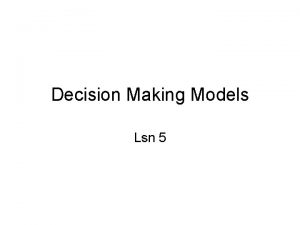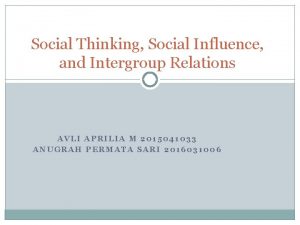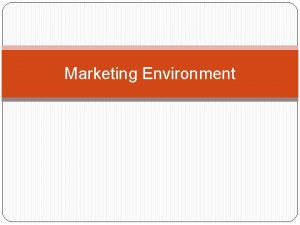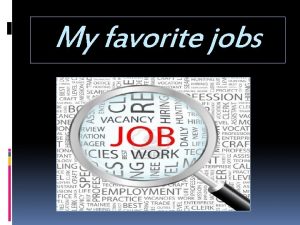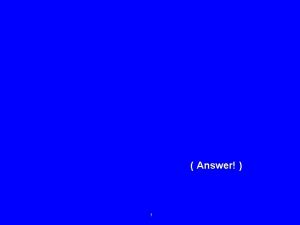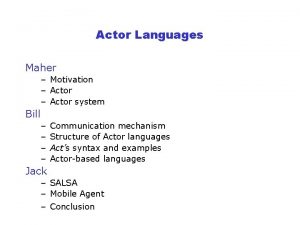Actors in Social Policy A policy actor is









- Slides: 9

Actors in Social Policy A policy actor is an entity that enacts a certain policy action. Policy actors can be categorized broadly into three sectors of society: State, Market and Citizens. Explanation is as follows: -

Individual Citizens/ Interest groups People can be mobilized. People will often act when something threatens their livelihood or their lifestyle, such as when new commercial development may disturb their neighbourhood, or when government is unresponsive to local needs for education or public safety. People may remain mobilized until the issue is somehow resolved, whether or not it is resolved to their satisfaction, and sometimes mobilization leads to the creation of interest groups. So this can also called public opinion or public mind. Interest groups are important --perhaps central—to the policy making process because the power of individuals is greatly magnified when they form groups. Some groups have considerably more power than other groups, often called special interest groups. Larger groups can be expected to be taken more seriously by the governments. One of the most important resources of interest groups is knowledge: specifically, information that might be unavailable or less available to others. Legislators and bureaucrats draw on this information to help them make decisions.

Policy Entrepreneurs An individual who changes the direction or flow of politics and public policy. Entrepreneurs develop new and innovative policies and are willing to invest their resources, time, energy, reputation, money in the hopes of future returns. Returns might come in the form of policies that they approve, satisfaction from participation, or even promotion of personal interest.

Social Movements and Mobilization When groups of people mobilize and coalesce around a set of highvisibility issues, a social movement may result. Social movements often involve a coalition of groups with similar goals, and other people support movements without a formal group affiliation. Recent social movements include the civil rights and women’s rights movements. In the 1960 s and 1970 s, and continuing today, women’s groups promoted policies to create equal pay in the workplace, issue of sexual harassment, and so on. These actions are the result of citizens coming together and pressing for change, both within and outside official institutions. Protest marches are, of course generally legal in democratic countries.

Think Tanks and other Research Organizations The emergence of complex problems and the need for greater analytic capacity than that possessed by the federal and state governments has led to the growth of independent research organizations, often called think tanks. Employing scholars and policy experts, these organizations provide information that policy makers and other influential people can use to make better policy. Some think tanks and research organizations are associated with universities and provide valuable input into the policy process. They are often good sources of information and ideas for research on important policy issues.

Communications Media Electronic and print media is important in politics and public policy. The “watchdog” function of the media, in which it is assumed that the news media provide citizens with information about government that people can use to support or challenge policy decisions. The press today consists of traditional outlets such as magazines, newspapers, radio and television, but also extends to websites, blogs and social networks. Media pressurize the policy makers to pay attention to problems.

Policy Domain A policy domain is the substantive area of policy over which participants in policy making compete and compromise, such as the environmental policy domain or the health care policy domain. Of course, some of these domains are so vast that they contain other domains, such as environmental policy domain consists of air pollution domain, water pollution domain etc. The activities that take place within these domains are influenced by other domains, and issues and ideas often spill over from one domain to the other. Within the policy domain is the policy community, which consists of actors who are involved in policy making in a particular domain. The policy community consists of those who are most expert in studying, understanding, negotiating, or explaining an issue.

Sub-governments All province governments, many city governments and the key associations that represent governors, legislators, state judges, and local governments participate in federal policy making at every stage of the process. At the same time, the devolution of power to local and provincial governments creates new venues for interest groups to participate in policy making, because provincial and local governments are again very important decision-making bodies.

Conclusion Policy making is indeed a slow and challenging process, and sometimes groups disadvantaged and unable to do much to cause change. Because it is not easy to achieve social change but actors in the policy process can and must interact with each other to advance policy proposals. Without this interaction, nothing would happen, and policy making would come to a standstill.
 Actors in foreign policy
Actors in foreign policy Rational actor model cuban missile crisis
Rational actor model cuban missile crisis Apa itu social thinking
Apa itu social thinking Social thinking social influence social relations
Social thinking social influence social relations Use case with multiple actors
Use case with multiple actors Use case primary and secondary actors
Use case primary and secondary actors Pengertian include dan extend
Pengertian include dan extend Include and extend in use case
Include and extend in use case Acting queue
Acting queue What's marketing environment
What's marketing environment
